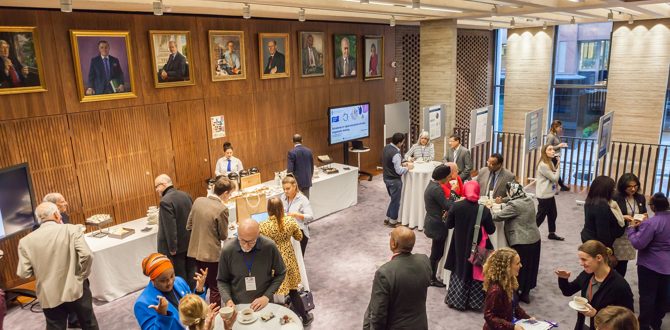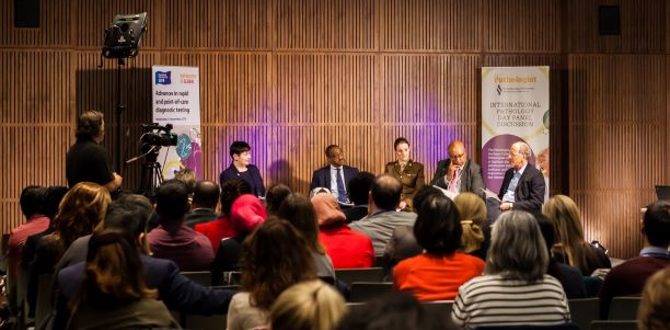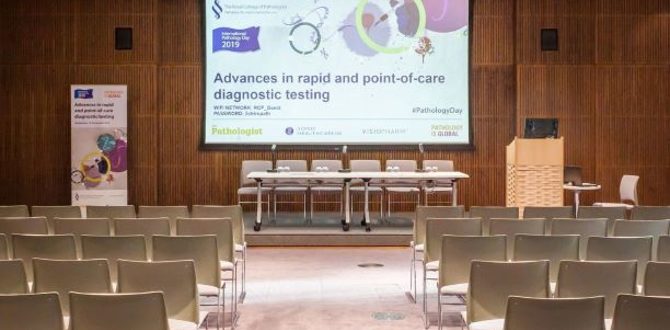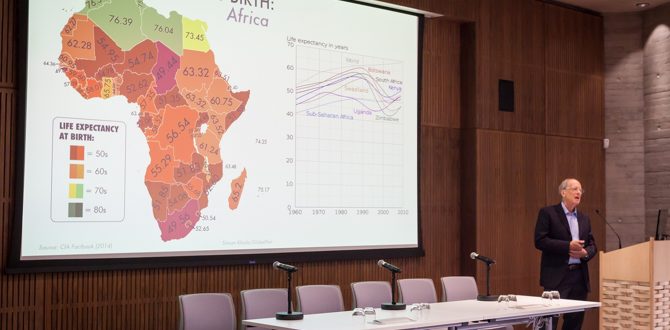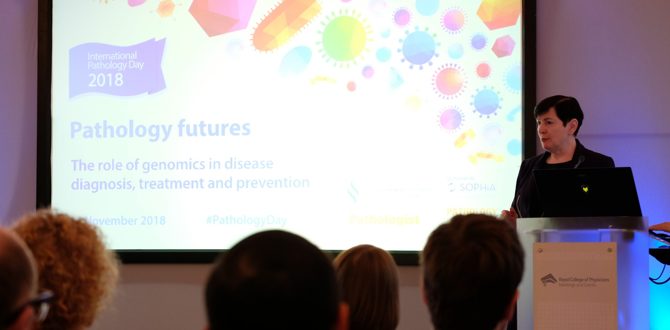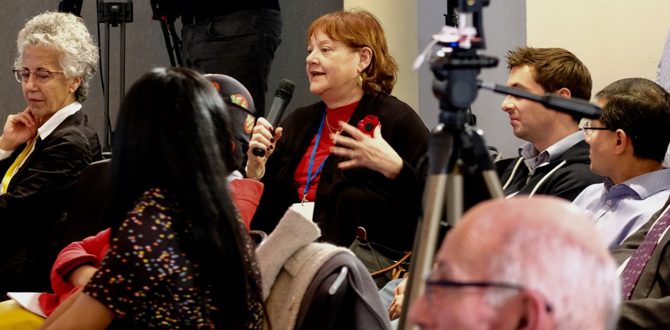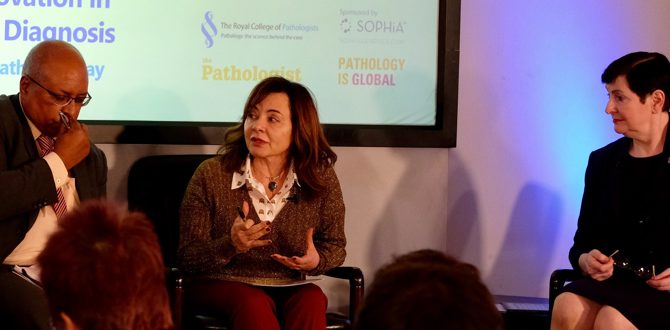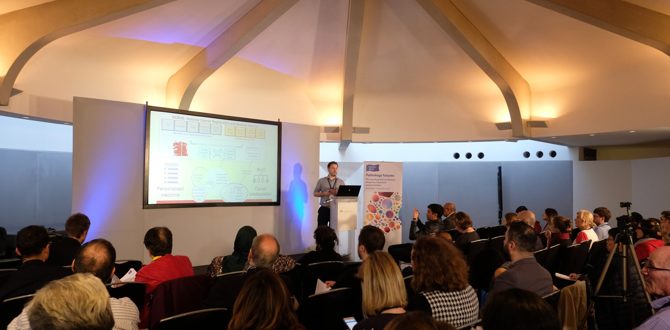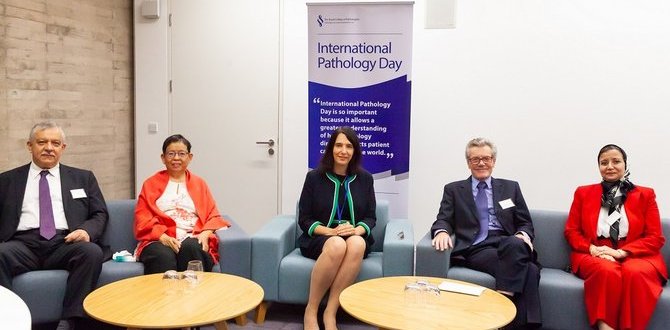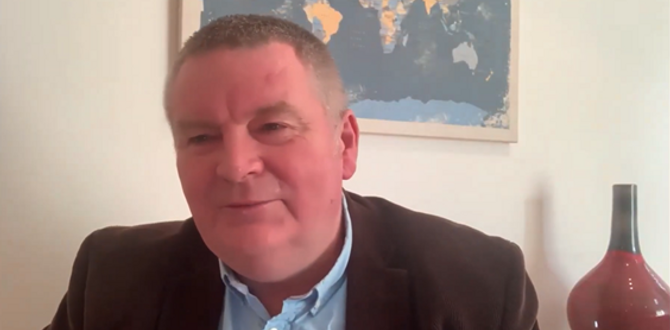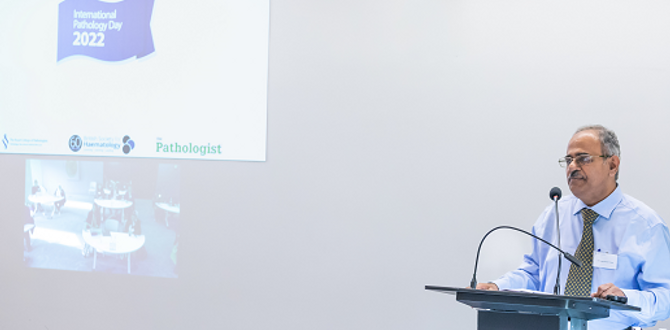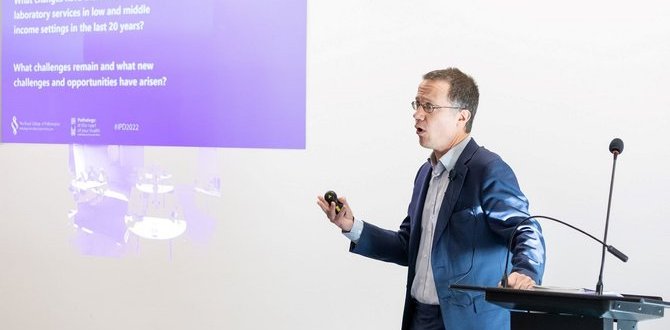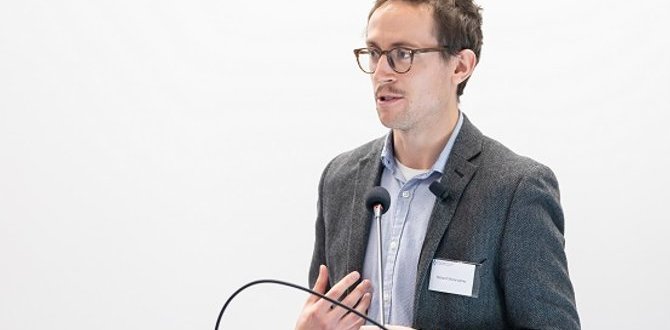Previous International Pathology Day (IPD) events
2023: The impact of climate change on diseas and what can be done to tackle the challenges
The conferenced sponsored by The British Society for Haematology and The Pathologist marked the final time Professor Mike Osborn would open the conference as College President and was the perfect time to introduce and hear from then incoming President, Dr Bernie Croal. Around 60 participants and 12 event contributors took to their screens from around the world to join us on Wednesday 8 November 2023.
The theme examined how climate change has been identified as a leading health threat, with the power to reverse decades of advances in global health, placing increased pressures on already fragile health systems. The conference concentrated on the impact of climate change on disease, focusing on ways to tackle the challenges faced by pathologists, scientists, and the wider population. The event will also discuss extreme weather events, such as flooding, wildfires, and scorching temperatures, which contribute to the burden of disease and the evolution of existing diseases.
2022: Adapting laboratory medicine to global challenges and developments
This conference marked the College's 60th anniversary year and the first hyrid event for International Pathology Day. The theme looked at how over several decades, pathology specialties have used therapeutic and preventative solutions to manage health crises worldwide, such as tackling sudden and novel infectious disease outbreaks while also preparing for how pathology can prepare for future health crises.
Capacity building to develop and strengthen local health systems through training and educating health workers, particularly medical scientists, and pathologists, in partnership with organisations and international volunteers also featured at the event.
2021: Digital pathology and aspects of artificial intelligence (AI) - a worlds eye-view
The event was run virtually for a second year, in association with sponsor Sonic Healthcare UK and partner The British Society for Haematology (BSH).
Pathology is undergoing a digital revolution. Pathologists can now engage, evaluate, and collaborate rapidly and remotely, with transparency and consistency even when separated by thousands of miles, in ways never done before.
The growth in the use of digital pathology is also paving the way for artificial intelligence (AI) to become more widely integrated. AI has the potential to help provide faster diagnoses, as well as allowing international scientists to work more collaboratively to develop their understanding of disease and diagnostics.
We heard how digital pathology has made international collaborations between developed and middle-to-lower income countries possible and what some of the real-world issues to implementing digital and AI solutions into the lab will be. The day also examined how pathologists, scientists and medical professionals will need to learn new ways of working in different surroundings, as technology moves us deeper into a digital age.
Read more about what happened via our blog celebrating International Pathology Day 2021.
2020: Infection through the lens of COVID-19 with an international viewpoint
In the best interests of the international community we brought everyone together for a virtual conference. Organised once again in collaboration with The Pathologist magazine and sponsor Sonic Healthcare UK. We were also pleased to welcome the British Society for Haematology to our collaborations for the first time.
As the world continues to reel from the devastating effects of the COVID-19 pandemic, International Pathology Day explored infection.
The event focused on the methods and models that have been developed to manage infection around the world, the day also explored how the global pathology community has managed infectious outbreaks in the past and how it is dealing with the current outbreak of COVID-19.
Themes explored on the day included the social, economic, cultural, technical, and biological factors that impact on controlling the spread of an infection, the role of testing and the search to discover a vaccine and treatments.
Read more about what happened via our blog celebrating International Pathology Day 2020.
2019: Advances in Rapid and Point-of-Care Diagnostic Testing
The College once again hosted a conference, organised in partnership with The Pathologist magazine as well as Sonic Healthcare UK and Visiopharm to bring together a global audience in celebration of a shared passion for pathology.During the first half of the day we heard from speakers, who gave talks on wide ranging topics which included: advances in rapid and point-of-care testing, developments in point-of-care testing across eastern and southern Africa, self-collection, weighing up the advantages against the challenges and how this has changed work in terms of sexual health screening and diagnostic probes for point-of-care testing.
Judging of the poster competition sponsored by Sonic Healthcare UK.themed Bench to Bench: From Basic Science to Clinical Care started off he lunchtime activities. Participants also received the opportunity to attend a lunchtime workshop sponsored by Visiopharm. The session focused on a day in the life of an augmented pathologist, during which the pros and cons of artificial intelligence in healthcare, specifically pathology, were explored. Highlighting both the positive and negative impacts.
The afternoon featured a roundtable discussion on the theme ‘A Question of Quality.’ The discussion was streamed live as a webinar, in conjunction with The Pathologist. We were delighted that people from 47 different countries from around the globe were able to join us remotely to listen in on the discussion and contribute questions to the panel of four experts within their field.
You can read more about what happened during International Pathology Day 2019 in our highlights blog post.
2018: Pathology futures
The role of genomics in disease diagnosis, treatment & prevention
For IPD in 2018, the College hosted a one day conference, organised in partnership with The Pathologist magazine.
The role of genomics in the diagnosis and treatment of disease is growing at a phenomenal pace, allowing patient care to become more personalised. As a result, pathologists are not just involved in an initial diagnosis; now, they are involved in the entire treatment pathway of a patient. Where a disease has a genetic basis and molecular testing is therefore performed, the role of the pathologist in guiding treatment through the course of a patient’s therapy is crucial.
This event explored the contribution of pathologists, scientists, and laboratory medicine professionals in the treatment pathway and care of patients, and how the results from research undertaken in the laboratory are directly used to develop new ways to treat patients and combat disease.
Roundtable: Out of the Box Pathology... How the Profession is Helping to Drive Innovation in Disease Therapy and Diagnosis
This unique panel event delved into unchartered territory for most pathologists; their crucial role in discovering new drug targets and therapeutics working within, or in collaboration with, industry. This fascinating discussion was chaired by Professor Jo Martin, President of the Royal College of Pathologists and delivered by pathologists who took the less trodden career route to work on some ground breaking discoveries and life-changing projects.
Missed the discussion? Register here to watch on demand.
2017: Implementing the 2017 WHO Cancer Resolution
Time to acknowledge the critical role of pathology & laboratory medicine services?
For IPD in 2017, the College hosted a roundtable discussion on the critical role of pathology and laboratory medicine services in meeting the commitments of the World Health Organisation's (WHO) Cancer Resolution, which was unanimously adopted at the World Health Assembly (WHA) in May 2017.
Organised in partnership with The Pathologist magazine and chaired by former College President Dr Suzy Lishman, this important roundtable bought together an internationally-renowned panel of speakers to discuss, explore and debate ways to ensure that national cancer control plans adequately address the provision of effective, affordable and sustainable pathology services as part of the global effort to strengthen and improve cancer control activities.
2016: How can we strengthen pathology education & training in low and middle-income countries?
Organised in partnership with The Pathologist magazine and chaired by Fedra Pavlou, Editorial Director at The Pathologist, roundtable participants discussed the strengthening of pathology education and training in low and middle-income countries.
2015: The global village
The second International Pathology Day took place on 18 November, with events taking place around the world to highlight the contribution of pathology to global healthcare. Events were held in countries including the UK, Australia, Canada, USA, Malaysia, Singapore, Hong Kong, Pakistan, India, Germany and Bosnia and Herzegovina. The College hosted a conference at the King’s Fund in London, with a wide range of speakers and audience members.
2014: Pathology is Global Symposium
In 2014, the College held a global health symposium, which brought together pathologists, scientists and international development professionals from around the world to explore the contribution and role played by pathology and laboratory medicine services in addressing global health challenges and improving health outcomes.
Chaired by Dr Suzy Lishman, then President-Elect of the College, key speakers at the ‘Pathology is Global’ Symposium included Professor Lai-Meng Looi, President of the World Association of Societies of Pathology and Laboratory Medicine (WASPaLM); Dr Zahir Moloo, Regional Clinical Director of Pathology at the Aga Khan University Hospital in Nairobi, Kenya; Professor Soo-Yong Tan, Director of SingHealth Tissue Repository in Singapore and Dr Abdul Ghafur, Co-ordinator of the Chennai Declaration on Antimicrobial Resistance in India.
The former College President, Dr Archie Prentice delivered the welcome address and symposium presentations covered a range of diverse topics that included: how international volunteering is making a difference; the role of the pathologist in bio banking and translational research, improving the diagnosis and reporting of breast cancer in Lagos, Nigeria; building laboratory workforce and service capacity in Eastern Europe (using Tajikistan as a case study); tackling antimicrobial resistance in India and recognising the international role of UK Diaspora pathologists and scientists. Biomedical Scientist, Dorothy Kasibante gave a powerful and moving personal account of her reasons for volunteering to improve laboratory services in Sub-Saharan Africa.
The symposium provided attendees with an opportunity to learn about the invaluable work and impact that pathologists, scientists and laboratory medicine professionals are making all over the world, as well as hear about the many international opportunities available through volunteering, research and the development of collaborative global health partnerships.

